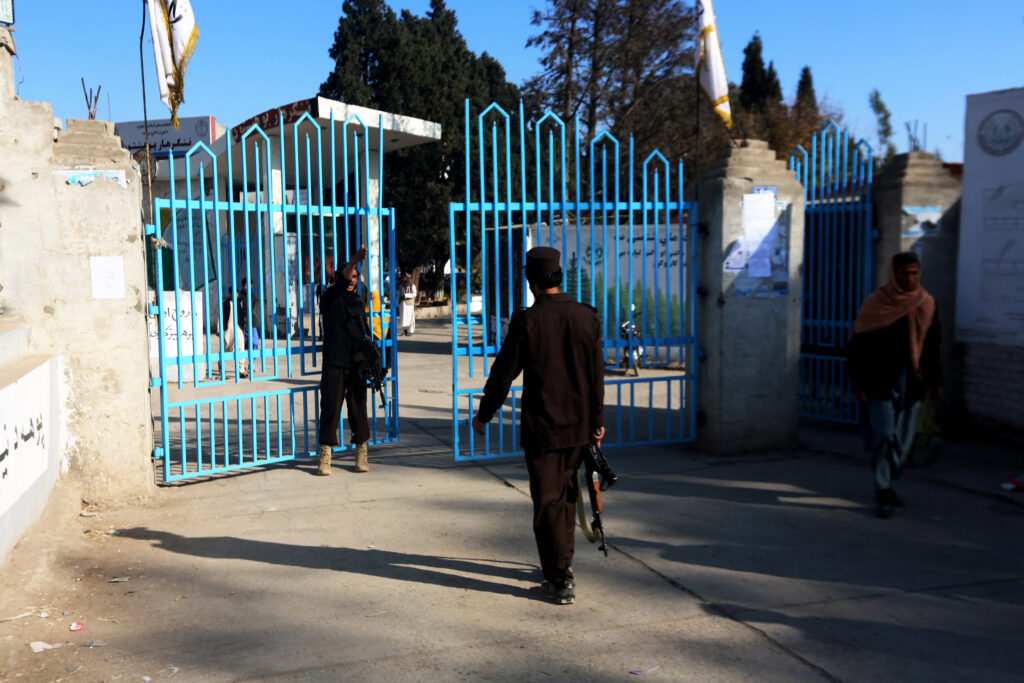Afghanistan’s Taliban-led government barred women from attending universities across the country and enforced the order at gunpoint in some places, disregarding global condemnation and inflicting another blow to half its population’s rights.
“According to a cabinet decision, you are all instructed to immediately carry out the mentioned order of suspending girls’ education until further notice,” the Taliban’s minister of higher education, Neda Mohammad Nadeem, said in a statement on Tuesday. “Make certain that the order is executed.”
The militants wasted little time ensuring the decree was obeyed.

“We came to the university at around 7 a.m. in the morning. The boys were allowed to enter and they pointed guns at us and told us to go home,” Tamana Aref, a female student at the private Kardan University in Kabul, said in a phone call. “The last remaining hope is lost and gone. The country’s been taken back to the 1990s that everybody had feared.”
Minister Nadeem — one of the Taliban’s most conservative members — recently said women’s education isn’t an Afghan tradition, but rather part of Western culture brought to the country during the presence of U.S. forces. Those remarks disregard the role women had during much of the 20th century in Afghanistan, helping draft the country’s constitution, winning the right to vote and running businesses.
U.S. Secretary of State Antony Blinken criticized the decision and said it would further set back the Taliban’s efforts to win recognition and support.
“Education is a human right,” Blinken said in a statement late Tuesday, warning there would be “consequences” to come. “It is also essential to Afghanistan’s economic growth and stability. No country can thrive when half of its population is held back.”
UN Secretary-General Antonio Guterres expressed “alarm” about the decision, according to a statement from his spokesperson. Human Rights Watch called the move a “shameful decision,” adding that “the Taliban are making it clear every day that they don’t respect the fundamental rights of Afghans, especially women.”
Even the government of neighboring Pakistan, with close ties to the militant group, said it was “disappointed to learn about the suspension of university and higher education for female students in Afghanistan.”
“We strongly urge the Afghan authorities to revisit this decision,” its foreign ministry said in a statement.
The Taliban barred most girls from going to school when they seized power in 2021 as U.S. forces withdrew. Late last year, the they dismissed thousands of Afghan women from government jobs and prevented them from traveling alone unless accompanied by a male relative. Women are also again required to wear head-to-toe burqas in public.
The Taliban’s move to restrict women from working could cost the Afghan economy up to $1 billion annually, or 5% of gross domestic product, according to the United Nations Development Programme. In addition, depriving 3 million teenage girls of a secondary education will cost Afghanistan at least $500 million annually, according to UNICEF.
Women are also barred from practicing law or serving as judges, prosecutors or defense lawyers. Of the nearly 300 female judges in Afghanistan prior to the takeover, 244 have been evacuated from the country.
Already shattered by decades of war and political turmoil, Afghanistan’s prospects have only declined since the Taliban takeover. A World Bank report issued last month described “a grim picture of living conditions in Afghanistan as widespread deprivation continues and food insecurity remains high, negatively impacting the economy and the welfare of the Afghan people, especially women and girls.”
Two-thirds of the country’s population struggle to meet basic food and non-food needs, according to the report, a situation exacerbated by drought and rising global food prices amid Russia’s war in Ukraine. In addition, 65% of those surveyed said they expect their economic conditions to worsen in the coming year.
___
© 2022 Bloomberg L.P
Distributed by Tribune Content Agency, LLC.



